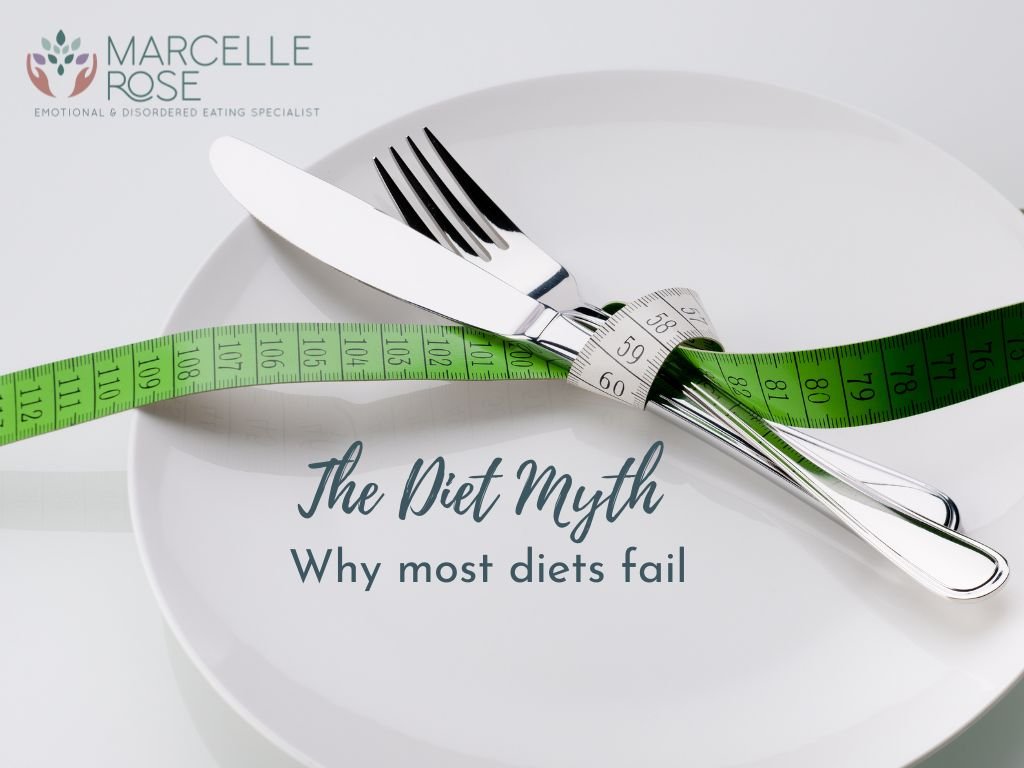The Diet Myth: Why most diets fail
Many people find that their first attempt at dieting is successful. They stick to the rules over a relatively short period of time and the weight is lost – it is seen as a successful diet.
Later down the line when the individual regains the weight they see it as their own failure –do you relate to this? Do you blame your lack of will power and restraint for weight regained?
The truth is there are biological and psychological reasons why, the majority of diets fail in the long term.
Statistics reveal that it is diets that fail and not you or your lack of will power. This issue is compounded by the weight-loss industry often citing results from studies conducted for less than a year, sometimes only for a few weeks or months. Long-term scientific studies, assessing weight loss over periods of 1 to 5 years, consistently demonstrate that diets are not successful for the majority of people in maintaining weight loss.
An example of this – is the largest study carried out on the outcomes of a low fat diet on over 20,000 women – known Women’s Health initiative. After nearly 8 years there was no change in weight from where they started their diet and their waist circumference had increased – any weight was lost at the beginning of the diet was subsequently regained.
And these results are consistent with various diet types. Data comparing the Atkins diet to other diets indicated that dieters began to gradually regain the weight lost during the last 6 months of the year of the diet despite increasing their exercise.
Losing weight and keeping it off is not as ‘easy’ as the diet industry would have you believe. Research not only indicates that dieting results in the regain of any weight lost, but it is also a robust predictor of additional weight gain.
This is partly explained by weight set point. The body will adjust internal systems to alter food intake and energy expenditure. Metabolism will slow down, and commonly appetite ( and cravings) will increase to help the body defend it’s set point range, rather like a heating thermostat in your home. When a dieter can no longer sustain a restricted diet, they often experience weight regain (sometimes gaining more than they started the diet with)
What’s more, diets promote restriction and deprivation – a recipe for disaster. Firstly, for most people, any type of diet, low calorie, low carb/ fat or fasting etc is unsustainable in the long term. Further, feeling deprived of certain foods can lead to intense cravings and perhaps bingeing/ overeating of that food.
Dieting encourages and all or nothing mindset, so if you do break a dietary rule, you’re likely to feel like you’ve failed already and abandon all your efforts until you decide to start a new diet on Monday.
So what can you do instead?
If you have been dieting for years, there is another way. Learning to eat in a balanced way can gradually repair your metabolism and help you feel satisfied and fulfilled.
It can be transformative to focus your energy on developing a sustainable and enjoyable approach to food by eating enough, maintaining regular meal times and adding in nutritious tasty foods rather than eliminating them.
I guide you through all of this and much more in my upcoming book about overcoming emotional eating and bingeing, which will be out later this year.
But in the meantime, if you would like to start creating change in your life now, download my FREE guide Breaking the Cycle - Your First Steps to Healing Your Relationship with Food to kickstart your journey today
This invaluable resource will help you:
✔️Know when you’re really hungry and when you’re not
✔️Learn when to eat that’s best for you
✔️Know the best snacks to help you stop craving and feeling out of control

